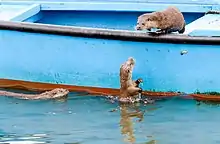lontra
Corsican

Etymology
From a Vulgar Latin variant of Latin lutra. Cognates include Italian lontra, French loutre.
Pronunciation
- IPA(key): /ˈlõntra/
- Hyphenation: lon‧tra
References
- “lontra” in INFCOR: Banca di dati di a lingua corsa
Galician

Alternative forms
Etymology
From Old Galician-Portuguese *lontra, from a Vulgar Latin variant of Latin lutra. Attested from 1439 (per the quote below). Compare Portuguese lontra, Spanish nutria; also Asturian llóndriga.
Pronunciation
- IPA(key): /ˈlontɾa/ [ˈlon̪.t̪ɾɐ]
- Rhymes: -ontɾa
- Hyphenation: lon‧tra
Noun
lontra f (plural lontras)
- otter
- 1439, X. Ferro Couselo, editor, A vida e a fala dos devanceiros, Vigo: Galaxia, page 420:
- da pelica da marta, hua branca, et da lontra, dous diñeiros, et da raposa, hun diñeiro
- a marten pelt, a branca [coin]; and of otter, two diñeiros; and of fox, a diñeiro
Derived terms
- lóntrega
References
Italian
Alternative forms
- lontro, ontria (dialectal, Tuscan)
- londra, ondra, ondria, itria, litria (dialectal, central Italian)
Etymology
From a Vulgar Latin variant of Latin lutra.
Pronunciation
- IPA(key): /ˈlon.tra/
- Rhymes: -ontra
- Hyphenation: lón‧tra
Descendants
- → Sardinian: lontra
References
- AIS: Sprach- und Sachatlas Italiens und der Südschweiz [Linguistic and Ethnographic Atlas of Italy and Southern Switzerland] – map 440: “la lontra” – on navigais-web.pd.istc.cnr.it
Maltese
Pronunciation
- IPA(key): /ˈlɔn.tra/
Portuguese

Etymology
From Old Galician-Portuguese *lontra, from a Vulgar Latin variant of Latin lutra. First attested in Gil Vicente's Auto das Fadas. Cf. also Old Galician-Portuguese luntria, attested in 1253.[1]
Pronunciation
- IPA(key): /ˈlõ.tɾɐ/
- Rhymes: -õtɾɐ
- Hyphenation: lon‧tra
References
- Joan Coromines, José A. Pascual (1985) “nutria”, in Diccionario crítico etimológico castellano e hispánico (in Spanish), volumes IV (Me–Re), Madrid: Gredos, →ISBN, page 252
Sardinian
Etymology
Probably a recent borrowing from Italian lontra, from a variant of Latin lutra. Wagner's Dizionario etimologico sardo (1960's) has no such entry, and the AIS (1920's) records no word for 'otter' in any part of Sardinia.[1] The apparent lack of dialectal variation, as well as the vowel /o/ for Latin /ŭ/, make a direct inheritance most unlikely.
Pronunciation
- IPA(key): /ˈlontra/
References
- Rubattu, Antoninu (2006) “lontra”, in Dizionario universale della lingua di Sardegna, 2nd edition, Sassari: Edes
- AIS: Sprach- und Sachatlas Italiens und der Südschweiz [Linguistic and Ethnographic Atlas of Italy and Southern Switzerland] – map 440: “la lontra” – on navigais-web.pd.istc.cnr.it